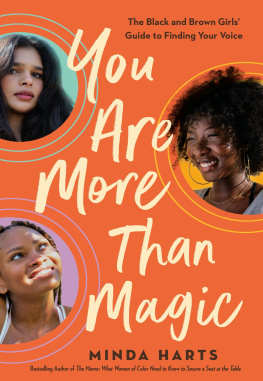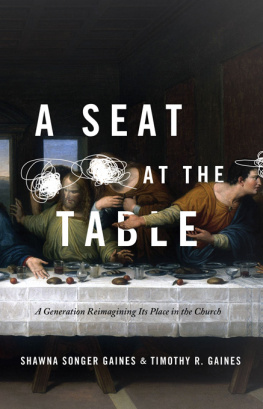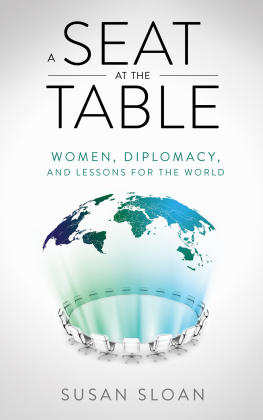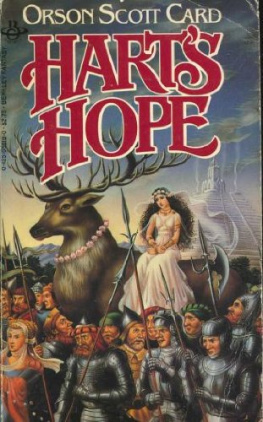Minda Harts - The Memo: What Women of Color Need to Know to Secure a Seat at the Table
Here you can read online Minda Harts - The Memo: What Women of Color Need to Know to Secure a Seat at the Table full text of the book (entire story) in english for free. Download pdf and epub, get meaning, cover and reviews about this ebook. year: 2019, publisher: Basic Books, genre: Home and family. Description of the work, (preface) as well as reviews are available. Best literature library LitArk.com created for fans of good reading and offers a wide selection of genres:
Romance novel
Science fiction
Adventure
Detective
Science
History
Home and family
Prose
Art
Politics
Computer
Non-fiction
Religion
Business
Children
Humor
Choose a favorite category and find really read worthwhile books. Enjoy immersion in the world of imagination, feel the emotions of the characters or learn something new for yourself, make an fascinating discovery.

- Book:The Memo: What Women of Color Need to Know to Secure a Seat at the Table
- Author:
- Publisher:Basic Books
- Genre:
- Year:2019
- Rating:4 / 5
- Favourites:Add to favourites
- Your mark:
- 80
- 1
- 2
- 3
- 4
- 5
The Memo: What Women of Color Need to Know to Secure a Seat at the Table: summary, description and annotation
We offer to read an annotation, description, summary or preface (depends on what the author of the book "The Memo: What Women of Color Need to Know to Secure a Seat at the Table" wrote himself). If you haven't found the necessary information about the book — write in the comments, we will try to find it.
Minda Harts: author's other books
Who wrote The Memo: What Women of Color Need to Know to Secure a Seat at the Table? Find out the surname, the name of the author of the book and a list of all author's works by series.
The Memo: What Women of Color Need to Know to Secure a Seat at the Table — read online for free the complete book (whole text) full work
Below is the text of the book, divided by pages. System saving the place of the last page read, allows you to conveniently read the book "The Memo: What Women of Color Need to Know to Secure a Seat at the Table" online for free, without having to search again every time where you left off. Put a bookmark, and you can go to the page where you finished reading at any time.
Font size:
Interval:
Bookmark:
We dont have to fight what was once invisible and unspoken, and we dont have to do it alone, unprepared, or with eye rolls and resignations. In this eye-opening and timely book, Minda Harts puts words to our discomfort and our at-work slights, and gives us solutions and action steps to help secure our professional development and wellbeing. The Memo is a must-read for all women of color in business (and for all people who want to do better).
Natashia Den, NAACP Image Award Nominee and author of Grace
Minda Harts hasnt just written an excellent, down-to-earth, pragmatically actionable guide to career success for women of color; shes written a searingly accurate and brutally honest account of what its like to be Black while working and the countless barriers and microaggressions women of color face. The Memo is a must-buy, a must-read, and a must-giftId recommend every Chief Diversity Officer and HR department provide copies for all of management to read.
Cindy Gallop, founder and CEO of MakeLoveNotPorn
Pursuing a dynamic career as a woman of color in fast-paced, competitive, and often white-dominated spaces no easy feat. But with The Memo, Minda Harts has created a comprehensive and compelling guide on how to navigate our careers in spite of the obstacles we face. With lots of insight, research, and a nice dose of humor, Harts gives her reader the inspiration and motivation to go for her dreamsno matter how daunting. This book is a must-read.
Zeba Blay, senior culture writer at Huffington Post
For any woman, at any companyeven her own. To secure a seat at the table, securing this book comes first.
Danyel Smith, culture journalist and former editor of Billboard and Vibe
An essential and honest guide to taking our rightful place in the C-Suite with tangible solutions about how to break barriers and pave a new path for ourselvesand the next generation.
Jamia Wilson, director and publisher of the Feminist Press
Harts provides a necessary guide written from and to women of color followed by a much-needed wake-up call for her white readers, in howand how notto be an ally. The result is a much-needed new perspective on an overwhelmingly white genre.
Publishers Weekly
Copyright 2019 by Minda Harts
Cover design by Chin Yee-Lai
Cover image by Joseph Luis Palaez Inc/Getty Images
Cover copyright 2019 Hachette Book Group, Inc
Hachette Book Group supports the right to free expression and the value of copyright. The purpose of copyright is to encourage writers and artists to produce the creative works that enrich our culture.
The scanning, uploading, and distribution of this book without permission is a theft of the authors intellectual property. If you would like permission to use material from the book (other than for review purposes), please contact permissions@hbgusa.com. Thank you for your support of the authors rights.
Seal Press
Hachette Book Group
1290 Avenue of the Americas, New York, NY 10104
www.sealpress.com
@sealpress
First edition: August 2019
Published by Seal Press, an imprint of Perseus Books, LLC, a subsidiary of Hachette Book Group, Inc. The Seal Press name and logo is a trademark of the Hachette Book Group.
The Hachette Speakers Bureau provides a wide range of authors for speaking events. To find out more, go to www.hachettespeakersbureau.com or call (866) 376-6591.
The publisher is not responsible for websites (or their content) that are not owned by the publisher.
Some names and identifying details have been changed.
Library of Congress Cataloging-in-Publication Data has been applied for.
ISBNs: 978-1-58005-846-9 (hardcover); 978-1-58005-845-2 (ebook)
E3-20190705-JV-NF-ORI
Dedicated to my Mom, my first best friend.
Our gifts belong to us.
NTOZAKE SHANGE
I N 2012 , I was living in Los Angeles and trying to cope with the death of an unarmed black teenager named Trayvon Martin. I worked in a predominantly white environment, and no one in the office was talking about his death. Up until that point, I had never seen myself as an activist. Not in a Rosa Parks type of way. I did launch a grassroots campaign called Broke or Vote to get more middle-class and working-class people to the polls during President Barack Obamas second campaign, but that was the extent of my activism. I guess you could say I had been going through life with my head down; black women are often told to do just that, especially in the workplace. Even though I saw bias all around me, I knew I could never rock the boat and speak out on it. I mean, who would care or do anything about it? But something about Trayvons death touched me at my core. Maybe its because I have two younger brothers and plenty of black male cousins, and I know how easily one of them could be in this same situation. I am sure his death caused many of us to question how we could help. Then out of the blue, one of our administrative assistants asked me to join her for a march that was taking place in honor of Trayvon. She also asked if I wanted to buy an oversized hoodie that had Trayvons face on it, and as she walked away, she said, I figured you were the only one I could ask. Now I can only speculate on what she meant, and I joked around later with friends about this white woman giving me a Trayvon Martin hoodiedid she do that because I was the only black woman in the office? We (people of color) always question why others do some of the things they do. But I know she meant well!
Now youre probably wondering what this story has to do with The Memo, but it has everything to do with how I came to find my voice in advocating for women of color. I ended up going to that march and there were tons of white men and women marching, and it hit me. We need to be on the front lines of our own issues. I still wasnt sure what that meant for me, but I was constantly questioning where I fit into this advocacy equation. Fast forward a year and some change, and I was working on the East Coast. The verdict was out: George Zimmerman was not guilty. I cried that night as if I could feel the pain of Trayvons parents. And mixed in with those emotions, I was going through my own personal hell of working in an environment that was less than equitable. It was on that night that I realized I had to do something. My advocacy wouldnt be on the front lines with the Black Lives Matter movement; my advocacy would be inside the workplace advocating for women that looked like me. I had to fight systemic racism in a way that was authentic to me and that would allow me to use my expertise. Mellody Hobson would later use the term corporate Kaepernick, and I felt like I was something like a Kaepernick; addressing the inequalities that we often are scared to address. I had no idea what I would do or what it would look like, but I knew I had to do something!
Around the same time, Lean In by Sheryl Sandberg came out. I was heavily into professional development and consuming every business and self-help book I could get my hands on. After reading countless books, I realized that race or intersectionality was rarelyif evera topic of conversation. And the books I was reading and the content I was consuming were being produced by white women. It started to become very problematic for me to never read about the experiences of women of color at work. We were completely left out of most narratives. So I decided my form of advocacy would be to create a platform that served our needs and highlighted the challenges women of color face in the workplace. Again, I had no idea how that would look and wouldnt until 2015, when I was forced to write a business plan for my unnamed company. All I could think about was Shirley Chisholms quote, If they dont give you a seat at the table, bring a folding chair. And on a train ride from Washington, D.C., to New York City while listening to a Drake song called Trophies, through my earbuds came the lyrics Did yall boys not get the memo? And that line hit me like a ton of bricksthe workplace has not gotten The Memo: women of color deserve a seat at the table, and we are coming for those seats! It took time to build, but in the fall of 2015, I launched The Memo newsletter, and from there my business grew to include career boot camps, a speakers series, and an annual awards event. My activism was kicked off by Trayvon Martinhis death showed me that there was advocacy inside me waiting to come out. I went from someone who was fairly shy at times to someone speaking about the inequalities women of color face and challenging the lean-in doctrine. And in those days, Sheryl Sandberg could do no wrong, so most white women just looked at me sideways, but my message was resonating with women of color all over the country.
Font size:
Interval:
Bookmark:
Similar books «The Memo: What Women of Color Need to Know to Secure a Seat at the Table»
Look at similar books to The Memo: What Women of Color Need to Know to Secure a Seat at the Table. We have selected literature similar in name and meaning in the hope of providing readers with more options to find new, interesting, not yet read works.
Discussion, reviews of the book The Memo: What Women of Color Need to Know to Secure a Seat at the Table and just readers' own opinions. Leave your comments, write what you think about the work, its meaning or the main characters. Specify what exactly you liked and what you didn't like, and why you think so.







